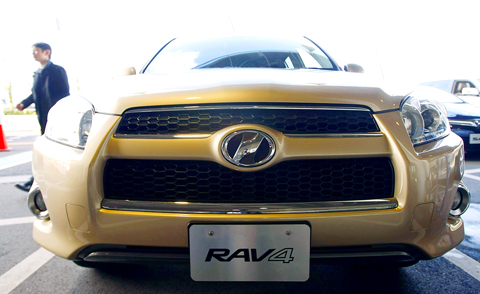Toyota Motor Corp will suspend US sales of eight models subject to a massive safety recall, an unprecedented move that sent its shares tumbling and raised questions about the timing of its earnings recovery.
Toyota said it would also halt production of the models, including the best-selling Camry, at plants in the US and Canada in the first week of February.
Shares in the world’s biggest automaker suffered their biggest slide in eight months, falling 4.3 percent in a Tokyo market down 0.7 percent yesterday.

PHOTO: EPA
Last week, Toyota announced it would recall 2.3 million vehicles in the US to fix potentially faulty accelerator pedals, its second large recall in four months in the US, its biggest market.
The series of recalls threaten to damage Toyota’s reputation for safety and quality that helped it ascend to the top of the global auto industry.
“This unprecedented automotive decision indicates how serious a safety problem this is,” said Michelle Krebs, senior analyst at Edmunds.com. “We’ve gone from floormats to recalls for wear items to a full shutdown, and I can’t help but think that the company’s credibility is being called into question.”
Toyota said the production halt would initially last a week before being reviewed. Officials could not recall a sales or production suspension resulting from vehicle defects on such a scale.
Toyota is considering whether it needs to issue a recall in Europe as well, where the same parts are used for some models.
The sales and production suspension could also affect its earnings in the near term.
“The recall itself won’t be a big problem for Toyota’s earnings, but suspending production and sales could have a big impact depending on how long it lasts,” said Koji Endo, an auto analyst at Advanced Research Japan.
The sales suspension and recall includes Toyota’s top-selling vehicle in North America, the Camry, for model years since 2007.
Also included are the 2009 and 2010 model RAV4, Corolla and Matrix, the 2008 through 2010 Sequoia, the 2007 through 2010 Tundra, the 2005 to 2010 Avalon and the 2010 Highlander.
Annual combined sales of these models are 1 million cars in North America, more than half of Toyota’s annual sales there last year, according to Endo. It is more than 2,700 units a day or 19,000 cars a week.

Nvidia Corp yesterday unveiled its new high-speed interconnect technology, NVLink Fusion, with Taiwanese application-specific IC (ASIC) designers Alchip Technologies Ltd (世芯) and MediaTek Inc (聯發科) among the first to adopt the technology to help build semi-custom artificial intelligence (AI) infrastructure for hyperscalers. Nvidia has opened its technology to outside users, as hyperscalers and cloud service providers are building their own cost-effective AI chips, or accelerators, used in AI servers by leveraging ASIC firms’ designing capabilities to reduce their dependence on Nvidia. Previously, NVLink technology was only available for Nvidia’s own AI platform. “NVLink Fusion opens Nvidia’s AI platform and rich ecosystem for

‘WORLD’S LOSS’: Taiwan’s exclusion robs the world of the benefits it could get from one of the foremost practitioners of disease prevention and public health, Minister Chiu said Taiwan should be allowed to join the World Health Assembly (WHA) as an irreplaceable contributor to global health and disease prevention efforts, Minister of Foreign Affairs Lin Chia-lung (林佳龍) said yesterday. He made the comment at a news conference in Taipei, hours before a Taiwanese delegation was to depart for Geneva, Switzerland, seeking to meet with foreign representatives for a bilateral meeting on the sidelines of the WHA, the WHO’s annual decisionmaking meeting, which would be held from Monday next week to May 27. As of yesterday, Taiwan had yet to receive an invitation. Taiwan has much to offer to the international community’s

CAUSE AND EFFECT: China’s policies prompted the US to increase its presence in the Indo-Pacific, and Beijing should consider if this outcome is in its best interests, Lai said China has been escalating its military and political pressure on Taiwan for many years, but should reflect on this strategy and think about what is really in its best interest, President William Lai (賴清德) said. Lai made the remark in a YouTube interview with Mindi World News that was broadcast on Saturday, ahead of the first anniversary of his presidential inauguration tomorrow. The US has clearly stated that China is its biggest challenge and threat, with US President Donald Trump and US Secretary of Defense Pete Hegseth repeatedly saying that the US should increase its forces in the Indo-Pacific region

ALL TOGETHER: Only by including Taiwan can the WHA fully exemplify its commitment to ‘One World for Health,’ the representative offices of eight nations in Taiwan said The representative offices in Taiwan of eight nations yesterday issued a joint statement reiterating their support for Taiwan’s meaningful engagement with the WHO and for Taipei’s participation as an observer at the World Health Assembly (WHA). The joint statement came as Taiwan has not received an invitation to this year’s WHA, which started yesterday and runs until Tuesday next week. This year’s meeting of the decisionmaking body of the WHO in Geneva, Switzerland, would be the ninth consecutive year Taiwan has been excluded. The eight offices, which reaffirmed their support for Taiwan, are the British Office Taipei, the Australian Office Taipei, the